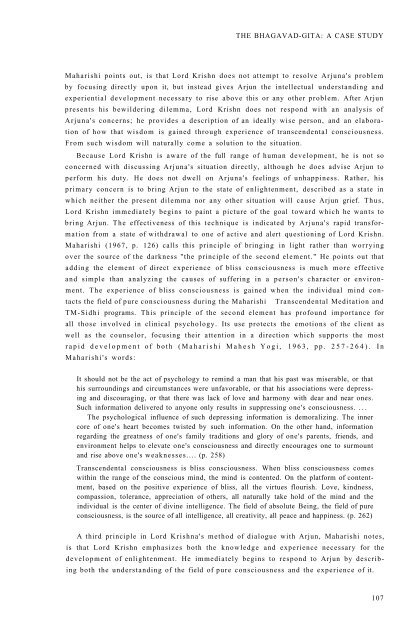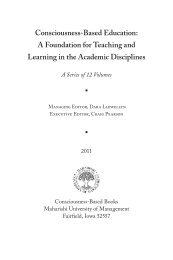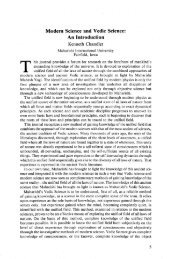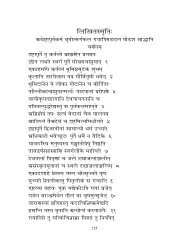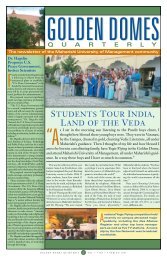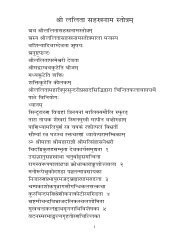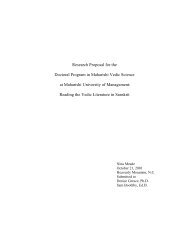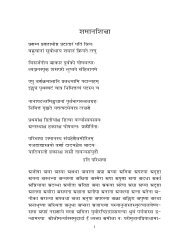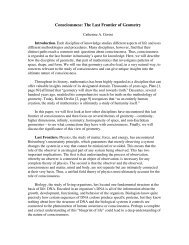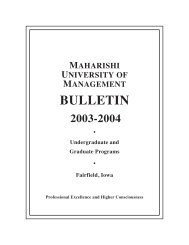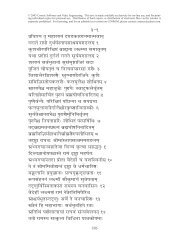The Bhagavad-Gita: A Case Study in Vedic Psychology - Maharishi ...
The Bhagavad-Gita: A Case Study in Vedic Psychology - Maharishi ...
The Bhagavad-Gita: A Case Study in Vedic Psychology - Maharishi ...
You also want an ePaper? Increase the reach of your titles
YUMPU automatically turns print PDFs into web optimized ePapers that Google loves.
THE BHAGAVAD-GITA: A CASE STUDY<br />
<strong>Maharishi</strong> po<strong>in</strong>ts out, is that Lord Krishn does not attempt to resolve Arjuna's problem<br />
by focus<strong>in</strong>g directly upon it, but <strong>in</strong>stead gives Arjun the <strong>in</strong>tellectual understand<strong>in</strong>g and<br />
experiential development necessary to rise above this or any other problem. After Arjun<br />
presents his bewilder<strong>in</strong>g dilemma, Lord Krishn does not respond with an analysis of<br />
Arjuna's concerns; he provides a description of an ideally wise person, and an elaboration<br />
of how that wisdom is ga<strong>in</strong>ed through experience of transcendental consciousness.<br />
From such wisdom will naturally come a solution to the situation.<br />
Because Lord Krishn is aware of the full range of human development, he is not so<br />
concerned with discuss<strong>in</strong>g Arjuna's situation directly, although he does advise Arjun to<br />
perform his duty. He does not dwell on Arjuna's feel<strong>in</strong>gs of unhapp<strong>in</strong>ess. Rather, his<br />
primary concern is to br<strong>in</strong>g Arjun to the state of enlightenment, described as a state <strong>in</strong><br />
which neither the present dilemma nor any other situation will cause Arjun grief. Thus,<br />
Lord Krishn immediately beg<strong>in</strong>s to pa<strong>in</strong>t a picture of the goal toward which he wants to<br />
br<strong>in</strong>g Arjun. <strong>The</strong> effectiveness of this technique is <strong>in</strong>dicated by Arjuna's rapid transformation<br />
from a state of withdrawal to one of active and alert question<strong>in</strong>g of Lord Krishn.<br />
<strong>Maharishi</strong> (1967, p. 126) calls this pr<strong>in</strong>ciple of br<strong>in</strong>g<strong>in</strong>g <strong>in</strong> light rather than worry<strong>in</strong>g<br />
over the source of the darkness "the pr<strong>in</strong>ciple of the second element." He po<strong>in</strong>ts out that<br />
add<strong>in</strong>g the element of direct experience of bliss consciousness is much more effective<br />
and simple than analyz<strong>in</strong>g the causes of suffer<strong>in</strong>g <strong>in</strong> a person's character or environment.<br />
<strong>The</strong> experience of bliss consciousness is ga<strong>in</strong>ed when the <strong>in</strong>dividual m<strong>in</strong>d contacts<br />
the field of pure consciousness dur<strong>in</strong>g the <strong>Maharishi</strong> Transcendental Meditation and<br />
TM-Sidhi programs. This pr<strong>in</strong>ciple of the second element has profound importance for<br />
all those <strong>in</strong>volved <strong>in</strong> cl<strong>in</strong>ical psychology. Its use protects the emotions of the client as<br />
well as the counselor, focus<strong>in</strong>g their attention <strong>in</strong> a direction which supports the most<br />
rapid development of both (<strong>Maharishi</strong> Mahesh Yogi, 1963, pp. 257-264). In<br />
<strong>Maharishi</strong>'s words:<br />
It should not be the act of psychology to rem<strong>in</strong>d a man that his past was miserable, or that<br />
his surround<strong>in</strong>gs and circumstances were unfavorable, or that his associations were depress<strong>in</strong>g<br />
and discourag<strong>in</strong>g, or that there was lack of love and harmony with dear and near ones.<br />
Such <strong>in</strong>formation delivered to anyone only results <strong>in</strong> suppress<strong>in</strong>g one's consciousness. ...<br />
<strong>The</strong> psychological <strong>in</strong>fluence of such depress<strong>in</strong>g <strong>in</strong>formation is demoraliz<strong>in</strong>g. <strong>The</strong> <strong>in</strong>ner<br />
core of one's heart becomes twisted by such <strong>in</strong>formation. On the other hand, <strong>in</strong>formation<br />
regard<strong>in</strong>g the greatness of one's family traditions and glory of one's parents, friends, and<br />
environment helps to elevate one's consciousness and directly encourages one to surmount<br />
and rise above one's weaknesses.... (p. 258)<br />
Transcendental consciousness is bliss consciousness. When bliss consciousness comes<br />
with<strong>in</strong> the range of the conscious m<strong>in</strong>d, the m<strong>in</strong>d is contented. On the platform of contentment,<br />
based on the positive experience of bliss, all the virtues flourish. Love, k<strong>in</strong>dness,<br />
compassion, tolerance, appreciation of others, all naturally take hold of the m<strong>in</strong>d and the<br />
<strong>in</strong>dividual is the center of div<strong>in</strong>e <strong>in</strong>telligence. <strong>The</strong> field of absolute Be<strong>in</strong>g, the field of pure<br />
consciousness, is the source of all <strong>in</strong>telligence, all creativity, all peace and happ<strong>in</strong>ess. (p. 262)<br />
A third pr<strong>in</strong>ciple <strong>in</strong> Lord Krishna's method of dialogue with Arjun, <strong>Maharishi</strong> notes,<br />
is that Lord Krishn emphasizes both the knowledge and experience necessary for the<br />
development of enlightenment. He immediately beg<strong>in</strong>s to respond to Arjun by describ<strong>in</strong>g<br />
both the understand<strong>in</strong>g of the field of pure consciousness and the experience of it.<br />
107


